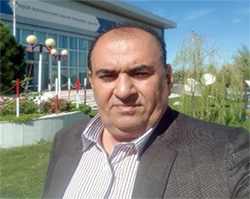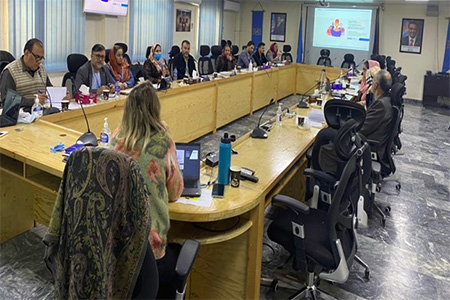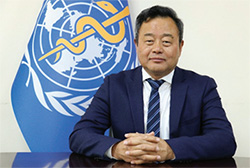 Sharifullah Haqmal, National Professional Officer at the WHO Afghanistan country officeAs a grade 3 emergency country, preventing and responding to sexual exploitation, abuse and harassment (PRSEAH) in Afghanistan is paramount across all areas of WHO’s work in Afghanistan to be able to effectively deliver on the ground. Respectful workplace focal point and National Professional Officer in the country, Sharifullah Haqmal, speaks on the importance of prioritizing PRSEAH within this context.
Sharifullah Haqmal, National Professional Officer at the WHO Afghanistan country officeAs a grade 3 emergency country, preventing and responding to sexual exploitation, abuse and harassment (PRSEAH) in Afghanistan is paramount across all areas of WHO’s work in Afghanistan to be able to effectively deliver on the ground. Respectful workplace focal point and National Professional Officer in the country, Sharifullah Haqmal, speaks on the importance of prioritizing PRSEAH within this context.
He highlights that identifying focal points for local nongovernmental organizations and providing them with training, can bring WHO’s partners up to speed, empowering them to serve as active “upstanders”, and adds that PRSEAH is now embedded within the contracts of WHO’s implementing partners. Additionally, all staff and non-staff receive training on the proper reporting channels for sexual exploitation, abuse and harassment. He thinks that attention should now be shifted towards helping WHO’s partners to better prevent and identify the sexual exploitation, abuse and harassment of beneficiaries in its various forms.
 Workshop with Sehatmandi PRSEAH focal points from 8 NGOs.However, implementing a zero-tolerance policy is challenged by the fear of reporting and retaliation, as well as the length of time it can take for an investigation to be completed. These concerns are also relevant outside WHO, due to the changing power dynamics in the country.
Workshop with Sehatmandi PRSEAH focal points from 8 NGOs.However, implementing a zero-tolerance policy is challenged by the fear of reporting and retaliation, as well as the length of time it can take for an investigation to be completed. These concerns are also relevant outside WHO, due to the changing power dynamics in the country.
To safeguard the measures for PRSEAH, he feels that multiple forms of action are essential. Each individual within the Organization should actively play their part through using training, webinars and other available resources to broaden their knowledge, and that “disciplinary action should always result after an investigation is completed”.
An emphasis should be made on behavioural red flags to counter sexual exploitation, abuse and harassment
For PRSEAH to be fully implemented at the country level and lead to tangible changes, he identifies some key factors. These include concerted efforts by the leadership, equipping focal points with greater knowledge on the matter and having a predictable budget for PRSEAH activities. Additionally, he says that having international and national staff serve as focal points would make work on PRSEAH more effective.
 Dr Luo Dapeng WHO Representative in Afghanistan Dr Luo Dapeng, WHO Representative in Afghanistan, notes that great progress has been made to ensure PRSEAH is embedded within WHO’s programmes and in work with its partners. “This was done through empowerment of staff and heightened engagement by everyone. Our context in Afghanistan poses some challenges, but we remain committed to sustaining the progress we have made so far.”
Dr Luo Dapeng WHO Representative in Afghanistan Dr Luo Dapeng, WHO Representative in Afghanistan, notes that great progress has been made to ensure PRSEAH is embedded within WHO’s programmes and in work with its partners. “This was done through empowerment of staff and heightened engagement by everyone. Our context in Afghanistan poses some challenges, but we remain committed to sustaining the progress we have made so far.”
 Sharifullah Haqmal, National Professional Officer at the WHO Afghanistan country officeAs a grade 3 emergency country, preventing and responding to sexual exploitation, abuse and harassment (PRSEAH) in Afghanistan is paramount across all areas of WHO’s work in Afghanistan to be able to effectively deliver on the ground. Respectful workplace focal point and National Professional Officer in the country, Sharifullah Haqmal, speaks on the importance of prioritizing PRSEAH within this context.
Sharifullah Haqmal, National Professional Officer at the WHO Afghanistan country officeAs a grade 3 emergency country, preventing and responding to sexual exploitation, abuse and harassment (PRSEAH) in Afghanistan is paramount across all areas of WHO’s work in Afghanistan to be able to effectively deliver on the ground. Respectful workplace focal point and National Professional Officer in the country, Sharifullah Haqmal, speaks on the importance of prioritizing PRSEAH within this context.
He highlights that identifying focal points for local nongovernmental organizations and providing them with training, can bring WHO’s partners up to speed, empowering them to serve as active “upstanders”, and adds that PRSEAH is now embedded within the contracts of WHO’s implementing partners. Additionally, all staff and non-staff receive training on the proper reporting channels for sexual exploitation, abuse and harassment. He thinks that attention should now be shifted towards helping WHO’s partners to better prevent and identify the sexual exploitation, abuse and harassment of beneficiaries in its various forms.
 Workshop with Sehatmandi PRSEAH focal points from 8 NGOs.However, implementing a zero-tolerance policy is challenged by the fear of reporting and retaliation, as well as the length of time it can take for an investigation to be completed. These concerns are also relevant outside WHO, due to the changing power dynamics in the country.
Workshop with Sehatmandi PRSEAH focal points from 8 NGOs.However, implementing a zero-tolerance policy is challenged by the fear of reporting and retaliation, as well as the length of time it can take for an investigation to be completed. These concerns are also relevant outside WHO, due to the changing power dynamics in the country.
To safeguard the measures for PRSEAH, he feels that multiple forms of action are essential. Each individual within the Organization should actively play their part through using training, webinars and other available resources to broaden their knowledge, and that “disciplinary action should always result after an investigation is completed”.
An emphasis should be made on behavioural red flags to counter sexual exploitation, abuse and harassment
For PRSEAH to be fully implemented at the country level and lead to tangible changes, he identifies some key factors. These include concerted efforts by the leadership, equipping focal points with greater knowledge on the matter and having a predictable budget for PRSEAH activities. Additionally, he says that having international and national staff serve as focal points would make work on PRSEAH more effective.
 Dr Luo Dapeng WHO Representative in Afghanistan Dr Luo Dapeng, WHO Representative in Afghanistan, notes that great progress has been made to ensure PRSEAH is embedded within WHO’s programmes and in work with its partners. “This was done through empowerment of staff and heightened engagement by everyone. Our context in Afghanistan poses some challenges, but we remain committed to sustaining the progress we have made so far.”
Dr Luo Dapeng WHO Representative in Afghanistan Dr Luo Dapeng, WHO Representative in Afghanistan, notes that great progress has been made to ensure PRSEAH is embedded within WHO’s programmes and in work with its partners. “This was done through empowerment of staff and heightened engagement by everyone. Our context in Afghanistan poses some challenges, but we remain committed to sustaining the progress we have made so far.”
 Sharifullah Haqmal, National Professional Officer at the WHO Afghanistan country officeAs a grade 3 emergency country, preventing and responding to sexual exploitation, abuse and harassment (PRSEAH) in Afghanistan is paramount across all areas of WHO’s work in Afghanistan to be able to effectively deliver on the ground. Respectful workplace focal point and National Professional Officer in the country, Sharifullah Haqmal, speaks on the importance of prioritizing PRSEAH within this context.
Sharifullah Haqmal, National Professional Officer at the WHO Afghanistan country officeAs a grade 3 emergency country, preventing and responding to sexual exploitation, abuse and harassment (PRSEAH) in Afghanistan is paramount across all areas of WHO’s work in Afghanistan to be able to effectively deliver on the ground. Respectful workplace focal point and National Professional Officer in the country, Sharifullah Haqmal, speaks on the importance of prioritizing PRSEAH within this context. Workshop with Sehatmandi PRSEAH focal points from 8 NGOs.However, implementing a zero-tolerance policy is challenged by the fear of reporting and retaliation, as well as the length of time it can take for an investigation to be completed. These concerns are also relevant outside WHO, due to the changing power dynamics in the country.
Workshop with Sehatmandi PRSEAH focal points from 8 NGOs.However, implementing a zero-tolerance policy is challenged by the fear of reporting and retaliation, as well as the length of time it can take for an investigation to be completed. These concerns are also relevant outside WHO, due to the changing power dynamics in the country. Dr Luo Dapeng WHO Representative in Afghanistan Dr Luo Dapeng, WHO Representative in Afghanistan, notes that great progress has been made to ensure PRSEAH is embedded within WHO’s programmes and in work with its partners. “This was done through empowerment of staff and heightened engagement by everyone. Our context in Afghanistan poses some challenges, but we remain committed to sustaining the progress we have made so far.”
Dr Luo Dapeng WHO Representative in Afghanistan Dr Luo Dapeng, WHO Representative in Afghanistan, notes that great progress has been made to ensure PRSEAH is embedded within WHO’s programmes and in work with its partners. “This was done through empowerment of staff and heightened engagement by everyone. Our context in Afghanistan poses some challenges, but we remain committed to sustaining the progress we have made so far.”








